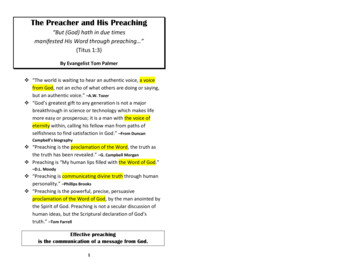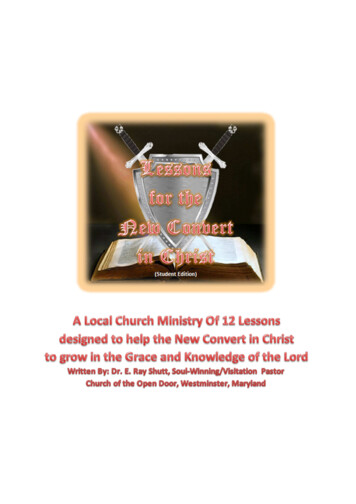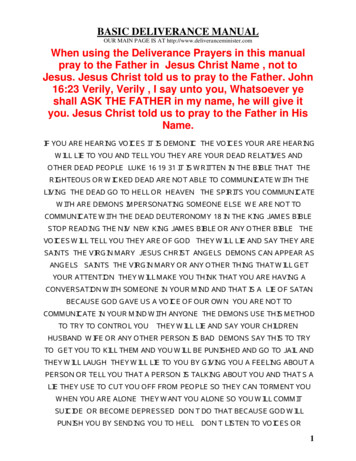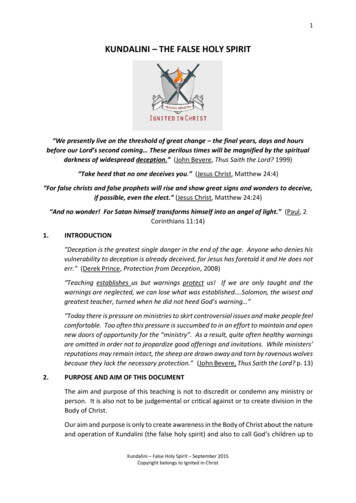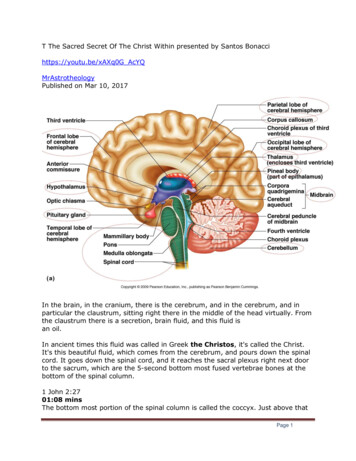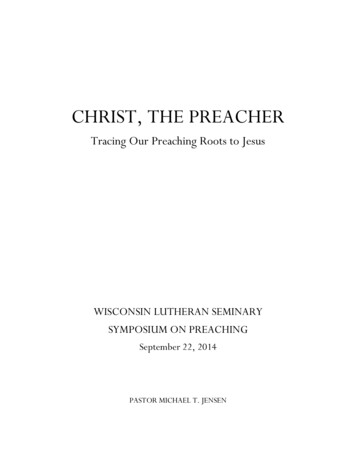
Transcription
CHRIST, THE PREACHERTracing Our Preaching Roots to JesusWISCONSIN LUTHERAN SEMINARYSYMPOSIUM ON PREACHINGSeptember 22, 2014PASTOR MICHAEL T. JENSEN
IntroductionLooking at your personal preaching roots, you will find many different homileticsprofessors along the way. For years it was your home pastor whose voice you can still hear.Through years of chapel you heard many different preachers, each with a unique style. You haveread many sermons, including those of Luther. Then there are your seminary homileticsprofessors and your supervising pastor who helped you cut your teeth on those early text studies,outlines, and manuscripts. As self-appointed adjunct members of the faculty, your classmateswere right there as well, sometimes too eager to critique, sometimes a bit hesitant because theywere up next.As we trace our common roots as Lutheran preachers, some would think it natural to firstlook back to the man whose name we bear. If we did, however, we would quickly hear Luthercrying, “Ad fontes!” as he points us to Scripture and the Man whose name we bear throughbaptism. “Ad fontes!” We make it our cry as well. Looking to Scripture, we see Jesus, our bestand truest homiletics professor. For our preaching, like our status before God, is rooted in him.In our time together we will consider Christ, the Preacher.1 Such a study both comfortsand encourages a preacher. Along the way Luther himself will join us2, chiefly throughquotations from a series of sermons on John 14:1-10.3 Luther considered these some of his bestAs we consider Christ, the Preacher, we remember that Scripture’s definition of “to preach” is much broader thanour narrowly defined delivery of a 15 minute, written out, and memorized sermon within a worship service. Theverb kηρύσσω is often translated “to preach.” Its noun is κήρυξ, a herald. Behind both the noun and the verb lies theidea that the messenger does not represent himself but someone else; the message is important, formal, andauthoritative because of the one from whom it comes not because of the messenger. (For a full discussion: TDNT,Kittel vol. III: 683-714) Other times you’ll find the verb “preach” in the English when the Greek has the verbεὐαγγελίζω “to evangelize, to preach the gospel.” Here again the all-important “good news” content is part of theverb itself and receives the emphasis. With both kηρύσσω and εὐαγγελίζω the emphasis is on what is preached orproclaimed instead of how or by whom. “Proclaim” is a fitting translation and is growing in favor. (Both the latestversions of the NIV and HCSB have the translation “proclaim” in places where traditionally we might have seen“preach.”) This move would seem good for a couple of reasons: First, in our culture many hear “preach” and doimmediately think of the narrow meaning, “to preach a sermon in a worship service”. Second, due to a lot of laworiented preaching, our culture has attached a negative connotation to the word “preach,” e.g., “Do not preach atme!” “Do not be so preachy.” Of course, even if the venue or format of the proclamation differed from what wecall a sermon, the lessons learned from Christ’s public proclamation impact how we publically proclaim hismessage in a sermon.2All Martin Luther citations, unless otherwise noted, are from Luther’s Works. American Edition. 56 vols. Editedby Jaroslav Pelikan and Helmut T. Lehman. Philadelphia: Muehlenberg and Fortress, and St. Louis:Concordia, 1955-86.3Martin Luther, “Sermons on the Gospel of St. John, Chapters 14-16, 1537,” LW AE 24:1-7311
and personal favorites.4 In these John 14 sermon selections of Luther (printed in italics for easyidentification) we see themes that are common to his overall preaching, themes that show he alsotraced his preaching roots to the Preacher.Christ, the PreacherPre-Incarnate PreviewWhen it came to you and me, no one knew for sure what kind of preachers we would be.Knowing us in our childhood, many would have concluded the worst.5 Only a mother’s heartwould blindly venture, “Oh, he’ll be wonderful!”Not so the case with Jesus. A study of Jesus as preacher begins not in the Gospels, butlong before his incarnation. Its roots go deep into the Old Testament. In eternity a Father’s heartknew and in the Old Testament he promised that Jesus’ preaching would be wonderful. 6In prophecy we do not receive much indication of the style of Christ’s proclamation.7Rather, when it speaks of the royal Prophet’s words, it dwells on the substance of the messagewhich is given by the Father.8 What would be the content of the Messiah’s preaching? The OldJaroslav Pelikan, “Introduction to Volume 24” Luther’s Works AE 24:ix,xPsalm 25:7 comes to mind.6In Deuteronomy 18:15-18 Moses points to Christ’s preaching ministry. His words foreshadow the Father’sTransfiguration endorsement of the preacher from Nazareth: “Listen to him!”7Song of Songs does show a passionate eloquence and beauty which we definitely can see in how the Bridegroomspeaks to his bride on the pages of the Gospels. In Isaiah 42:2 the Father gives us a glimpse of Christ’s overallgentle approach: “He will not shout or cry out, or raise his voice in the streets.” Even here we would note that anybeauty or nobility of style flows out of the substance of the message. The content is always foremost with the styleserving it, something good for all preachers to remember: When choosing the style of presentation always ask if itreflects the nobility and beauty of the message.8No surprise, the same is true of the only other preacher foretold in Scripture, the Messiah’s forerunner. [Althoughdoubtful according to a proper translation, some church fathers such as Hippolytus, Tertullian and Jerome wouldsuggest there is a prophecy regarding St. Paul in Jacob’s blessing of Benjamin in Ge 49:27.] In Isaiah 40:3 John issimply described as a voice, a description he gladly embraces (Jn 1:23). Nothing is said about the quality oreloquence of that voice. None of that matters. The focus is not on how the voice sounds but on what it says. [Somemay see a bit of John’s style described in Mal 4:5.] Yes, even in prophecy regarding John and Christ, the HolySpirit is laying out for us a preaching pattern of substance over style.452
Testament tells us in at least three ways: by his essence, by his office, and by giving us his“hometown” sermon text.The Essence of the PreacherThe Old Testament promised that the Messiah would be true LORD, the Son of Godcome into the flesh. Who is the LORD in his essence?Then the LORD came down in the cloud and stood there with him and proclaimed hisname, the LORD. And he passed in front of Moses, proclaiming, "The LORD, theLORD, the compassionate and gracious God, slow to anger, abounding in love andfaithfulness, maintaining love to thousands, and forgiving wickedness, rebellion andsin. Yet he does not leave the guilty unpunished; he punishes the children and theirchildren for the sin of the fathers to the third and fourth generation."9When Moses asked to see the LORD, he did. But with what did Moses truly see whoGod is? With his eyes or his ears? With his eyes Moses only gets half the story, and not the partGod wants to emphasize.With his eyes he sees what he already knew by conscience: God is holy. I am not. Thesight brings fear; the message is law.10 There were things about God’s nature that could only berevealed to sinful man through proclamation. “If you want to encounter God, you must first seeHim under the mask, in the Word.”11So, the LORD leads off his proclamation of his name with these attributes that areunknown to sinful man and lets those attributes dominate the proclamation of his name. As heproclaims, the LORD makes it clear that his gracious attributes are also expressed in graciousaction toward sinners.9Although to the best of my study it is not found as such in any lectionary, this section would be a very fitting textfor Transfiguration. You have the cloud. You have the Father speaking. The predominate message of his graciousattributes are revealed in his Son to whom the Father points at the Transfiguration: “This is my Son Listen tohim!” Also, following the Transfiguration Jesus will begin heading to the cross. Why? Because the LORDforgives “wickedness, rebellion and sin. Yet he does not leave the guilty unpunished.”10Such was also the experience of Isaiah: "Woe to me!" I cried. "I am ruined! For I am a man of unclean lips, and Ilive among a people of unclean lips, and my eyes have seen the King, the LORD Almighty" (Isaiah 6:5).11Martin Luther, “Sermons on the Gospel of St. John, Chapters 14-16, 1537,” AE 24:683
What the LORD proclaimed to Moses in private, God desired to proclaim to all.Therefore, he sent his Son to proclaim his name, i.e. who he is and what he has done for us.In the past God spoke to our forefathers through the prophets at many times and invarious ways, but in these last days he has spoken to us by his Son, whom he appointedheir of all things, and through whom he made the universe. The Son is the radiance ofGod's glory and the exact representation of his being, sustaining all things by hispowerful word. (He 1:1-3a).Jesus is the divine Logos through whom the Father has made himself known ascompassionate, gracious, loving, and forgiving.The Word became flesh and made his dwelling among us. We have seen his glory, theglory of the One and Only, who came from the Father, full of grace and truth.From thefullness of his grace we have all received one blessing after another. For the law wasgiven through Moses; grace and truth came through Jesus Christ. No one has ever seenGod, but God the One and Only, who is at the Father's side, has made him known (Jn1:14, 17-18).In these sections from John and Hebrews we note well the connection God makesbetween his essence, the incarnation, the gospel, and proclamation. The proclamation of law andgospel are simply a proclamation of who God is in his essence and in his actions toward sinners.Already in the Old Testament, before the incarnation, by virtue of who Jesus would be, we knowthe content of his preaching would be law and gospel with the gospel predominating.This intimate and inseparable connection between God’s essence, Christ’s person, andgospel proclamation was a foundation of the Lutheran Reformation and gave every reason topreach. It was also a favorite theme in Luther’s preaching:One must teach and believe: “I must and will hear or see no work, no worship of God, nospirituality, no holy life other than that of this Man Christ, or that which He transmittedto the apostles, and the apostles in turn, transmitted to preachers. When I hear these, Ihear Christ Himself; and when I hear Christ, I hear the Father.” Thus all must be woventogether and interrelated. And if the relationship is right, all must follow in a straightline. It is like tracing and following a river or a brook to its source, the spring. I drinkthe water from the pipes. It comes from the brooklet; and this, in the end flows from thespring.1212Martin Luther, LW AE 24:704
The Prophetic OfficeThe prophets were vivid prefigures of The Prophet. Their office was not only aforeshadowing, it was a pre-incarnate extension of the Messiah’s Predigtamt. As such theirmessage was his, his message theirs.13When we look at the content of the Old Testament prophets, we see law and gospel withthe overall purpose to proclaim the good news of the coming Savior. Jesus makes this pointwhen he says, “These are the Scriptures that testify about me” (Jn 5:39). Peter says, “All theprophets testify about him that everyone who believes in him receives forgiveness of sinsthrough his name" (Ac 10:43). In Isaiah, where one can argue the Old Testament office ofprophet reaches its highest height, we read of this most glorious function of the prophets: “Howbeautiful on the mountains are the feet of those who bring good news, who proclaim peace, whobring good tidings, who proclaim salvation, who say to Zion, "Your God reigns!" Listen! Yourwatchmen lift up their voices; together they shout for joy. When the LORD returns to Zion, theywill see it with their own eyes (Is 52:7, 8).In reality the message of Christ’s prophetic office never changes in content, but only intime as it relates to the plan of salvation. Isaiah prophesies, “The virgin will be with child.” Johnsays, “Look, the Lamb of God!” Jesus says, “I who speak to you am he.” Peter and the otherapostles declare, “God has made this Jesus, whom you crucified, both Lord and Christ.” Lutherpreached, “All our teaching and faith must revolve about Christ and be centered in this onePerson.”14 Occupying that same prophetic office, you and I rejoice to declare, “Christ has died!Christ has risen! Christ will come again!”13How intimately connected was Christ to the office and message of his prophets? How active was the preincarnate Prophet in the work of the prophetic office? To be sure those prophets spoke his very words through theintimate miracle of inspiration. But, the connection may be even more personal. From the time of Abraham untilZachariah we read the phrase ‘the word of the LORD came to .” No doubt this phrase speaks ofdirect revelation from God to an individual and assures us that the prophet’s message was indeed the Son of God’smessage. Often we view this phrase as a personification of the process of revelation. Is it perhaps more?Could it be “The word of the LORD came” is not a personification of a process but a statement telling us that theSecond Person of the Trinity, the pre-incarnate Word, personally came and brought his proclamation to the prophet?Perhaps there’s no answer to the question. Whatever the method of delivery, divine revelation assures us the OldTestament prophets spoke the very words of the Prophet who was to come.14Martin Luther, LW AE 24:32 Luther makes these comments when talking about the theme of John’s Gospel.5
The Reformation grabbed onto this biblical truth. Luther preached: “In this way allsermons delivered in Christendom must proceed from this one Christ.The office I fill is notmine; it is the Lord’s office.”15 Luther so embraced the truth that he was speaking for Christ thathe often broke into the first person when preaching the gospel.16 It brings a very personal andpastoral17 tone to Luther’s preaching.Whatever help and consolation you seek and look for from God, expect it also from Me. Iwill surely not disappoint you, just as God Himself will not fail you. If I have aided youhitherto and supplied all your wants, if I have shown Myself with words and deeds asOne in whom you find comfort and on whom you can boldly rely, if I have never left youin the lurch before – I will not do so in the future either.18Knowing that the preacher spoke for God, the Reformation elevated the importance of thesermon: “It is all from God, who condescends to enter the mouth of each Christian19 or eachpreacher and says, If you want to see Me or My work, look to Christ; if you want to hear Me,hear this Word.’”20Yes, glorious honor, glorious grace! God has called you and me into the same office asMoses, Elijah, Peter, Paul, etc., the same office as Christ! And, no matter where you findyourself in history, Christ’s prophetic office proclaims Christ. Therefore, already in the OldTestament prophets we get a preview of Christ’s preaching.15Martin Luther, LW AE 24:66This was not Luther preaching what we might call a “First Person” Sermon which is crafted and designed to havethe preacher speak for the biblical figure in the first person singular. Rather, for Luther who rarely had more than anoutline for his sermon, his use of the first person was unrehearsed and a very natural way for him to speak on behalfof Christ right to the heart.17Luther’s pastoral concern in preaching is also seen in that he often takes his hearers to their deathbed. Whilepreaching on Jn 14:5, 6 he preached, “When the hour comes in which our deeds and works must cease do not castabout for any way that bears the human label or the mark of our own good works or holy life. No, bury all this withan Our Father, and recite over it: “Forgive us our trespasses.” Hold solely to Him who says: “I am the Way.”Make sure then that these words are firmly imbedded in your consciousness, so deeply that you can feel Christ’spresence and He can say to you as He does to Thomas here: “Why are you seeing and looking for other ways?Look to Me and reject all other thoughts regarding ways to heaven. You may expunge these completely from yourheart and think of nothing but these words of Mine: “I am the Way.” See to it that you tread on Me, that is, cling toMe with strong faith and with all confidence of the heart. I will be the Bridge to carry you across.” LW AE 24:4218Martin Luther, LW AE 24:1819In this quote Luther does not only elevate the Predigtamt as a function of Christ’s prophetic office but alsoelevates the universal priesthood of all believers as a function of that office: “God condescends to enter the mouthof each Christian ”20Martin Luther, LW AE 24:66166
Isaiah 61Isaiah 61 is a gem of God’s grace. Compelled by his compassion and not confined by hiscreation called time, the Messiah actually gave the very words of his sermon at Nazareth overseven centuries before the words came from his lips. Not in the New Testament Gospels, buthere in Isaiah’s Old Testament Gospel we receive Christ’s own and most complete summary ofhis preaching. Not only is it a summary, it also serves as an encouraging example for preachersin the New Testament church.The substance is rich. It is comforting. It overflows with sweet gospel. In fact, it is allgospel, brought to us in a style that is stunning!The Spirit of the Sovereign LORD is on me,because the LORD has anointed meto proclaim good news to the poor.He has sent me to bind up the brokenhearted,to proclaim freedom for the captivesand release from darkness for the prisoners,2 to proclaim the year of the LORD’s favor. (Isaiah 61:1-2a)21“The Spirit of the Lord Yaweh is on me for Yaweh has anointed me to proclaim goodnews to the poor.” Amazing! In one sentence the Messiah summaries the whole content andpurpose of his preaching. By no coincidence, he also summaries the whole content and purposeof Holy Scripture. Like his Word, the Word has been given to reveal who God is and what he hasdone to save us.The Messiah begins by revealing to us that God is personal, Yaweh. He is not an energyor a life-force. He is an individual with essence, attributes, and a name, Yaweh.22 Specifically,the Messiah reveals God as three separate and distinct individuals, yet one God (The Spirit of theLord Yaweh. . .Yaweh has anointed me).With these words the Messiah immediately takes us to his baptism, an event that markedthe beginning of his public ministry. We might think of it as a sort of ordination for Jesus as he2122For our study today we concentrate on the portion of Isaiah 61 that Christ read as part of his hometown sermon.All of which Exodus 34 tells us is to be proclaimed.7
was anointed publically into his office. At our ordinations in sermon and song, readings and rites,it is proclaimed to the pastor elect and the people what this new pastor will preach. It was nodifferent at this Jordan River commissioning. Christ’s baptism revealed and proclaimed the onetrue triune God and Jesus of Nazareth as the Messiah. Who God is and what he has done for usin Christ, this is the purpose of Scripture, the purpose of Christ’s proclamation, and ourproclamation.The Messiah goes on to tell us something else we could not know by nature, somethingtotally unexpected: He has come to proclaim good news.23 Such good news is unexpected bysinners because by nature law is all we know. Law is our basic operating system; without lawnatural man does not think or feel or move. The law is our constant companion, clubbing away atthe conscience.24Knowing only law, we would expect that when God comes he would come to judge,avenge, and destroy.25 Wondrous surprise! God breaks into time and becomes one of hiscreatures not to tell us something we already know by nature. Into this world’s otherwiseunending cycle of despair and death, the Messiah comes with something other-worldly,something we would never know or experience apart from his proclamation.As the Messiah brings this good news announcement, he uses ר ָּשב ,ַׂ a verb that denotesgood news traveling from a place where the news is known to where it is not,26 especially newsHis good news is not a fluff piece meant to bring a momentary “Awwwh isn’t that nice” after the evening news’first 15 minutes of murders and the like. For fallen mankind, lost in sin and despair, facing physical and eternaldeath, the Messiah comes to proclaim truly good news, news that truly makes all the difference.24It’s with us sunup to sundown, working fear and worry. The law’s demands and fears are heard in the buzz ofthe alarm: “Get up. Get going. Go to work. Or, you’ll be late, be embarrassed, lose your job, your livelihood, yourhouse, your wife, your reputation, etc.” Night’s pillow promises no rest either. Slumber’s dreams are still awash inworry: worry over things done or undone, worry over words said or unsaid, worry over what has been, worry aboutwhat will be. Even as we rest, there is no rest. The cycle continues unbroken, day and night, season to season, fromtender youth to a ripe old age.25That’s what Luther originally thought, and we know the despair to which it drove him. Yes, we know that despairfrom the biographies of Luther and from our own autobiographies.23The opening verse of Luther’s Christmas hymn sings into one’s mind a fitting description of ַׂר ָּשב : “From heavenabove to earth I come to bear good news to every home; Glad tidings of great joy I bring, whereof I now will sayand sing.”268
of victory from the battlefield. The Messiah brings this good news to the poor or humble ( )ונַׂ ע ,ַׂ27who have been forced into that humble, cowering state by someone or thing.So, the Messiah comes proclaiming good news which he portrays in the most comfortingof pictures: 28 We have been pressed down by our sins. In fear we cower. Cowering is how wespend our days; it’s who we have become. But then there breaks good news, news we neverwould have heard if the King had not dispatched his Messenger. This Messenger has seen theheat of battle. He saw the victory banner unfurled.29 He comes to tell us: The King has won thevictory! Sin has been paid for! Death has been swallowed up in victory! Our days of coweringare over; his victory is ours!While his first utterance would have been enough, far more than we deserve, the Messiahcontinues to paint pictures of this gracious rescue. There’s nothing redundant in this repetition.Even in poetic parallelism, each brushstroke brings a new shade of grace to the canvass of thesoul.He has sent me to bind up the brokenhearted,to proclaim freedom for the captivesand release from darkness for the prisoners,to proclaim the year of the LORD’s favor.This good news heals a broken heart. No matter if it has been broken by self, others, orlife in general, the heart finds peace in the Messiah’s good news.30 To those who have been ledoff by sin, taken captive by it, left in the darkness of despair in this life with no hope for anythingbetter in the life to come, the Messiah comes with a message of freedom, a ransom paid forrelease, the doors to heaven flung wide open. His message announces his presenceassures the LORD’s acceptance and favor, an eternal Year of Jubilee!31Luther chose to translate den Elenden, “the miserable, the wretched.” In Luke 4 the Holy Spirit moves Luke tochoose πτωχός to bring ַׂונַׂ ע into the Greek. Thayer defines πτωχός as “to be thoroughly frightened, to cower down orhide oneself for fear.” Through usage πτωχός came to be used of a destitute beggar who cowers in fear as he begsand was at the mercy of all.28This picture the Messiah gives of himself is exactly the one he ascribes to his gospel servants in Isaiah 52:7, 8.29Of course, Christ is both the victorious King and Messenger.30St. Augustine of Hippo’s: “Our hearts are restless until they rest in thee.”31“Year of the LORD”, especially in parallelism with “to proclaim liberty” is a reference to the Year of Jubilee inLeviticus 25. Cf. Lev 25:10.279
Why are we poor, brokenhearted, etc.? The blame is ours; we know it. Yet the Messiahsays nothing of it;32 his own summary of his preaching contains no law, only gospel. For asnecessary as the law is, to the Messiah it is so foreign a work (opus alienum, das fremde Werk)that he does not include it in his own summary of his preaching. He does not come to condemn;his lips speak grace. “Here and elsewhere I learn that all His words are intended to comfort me;yes, that all He says, does, and thinks is nothing but friendly and consoling words and works.”33We would be well-served to read Christ’s words in Isaiah 61 before every sermonpreparation.34 The predominance of the gospel in our sermons is rooted in what the Messiahhimself does right here. For here the Messiah shows us what our preparation and preaching is tobe. Like our Messiah, we do not come to announce law based tips for better living. We come toannounce something other-worldly, something that cannot be known or experienced apart fromGod’s proclamation. To proclaim this gospel is our sole reason for entering the pulpit. A merepassing mention of this gospel was not enough for the Preacher; it is not enough for anypreacher. Like Jesus, the Lutheran preacher gives the gospel. Then he gives it again, and again,and again. “How great is the love the Father has lavished on us!” (1 Jn 3:1) Lutheran preachinglavishes people with God’s love in Christ!Lavishing God’s people with gospel does not mean repetition of dry formulas. Rather, itdoes what the Messiah did in Isaiah 61. Like Jesus, the preacher explores different aspects ofGod’s grace in Christ. He speaks to the head and heart with pictures, each capturing a differentnuance of grace. Like Jesus, these pictures are drawn from Scripture (e.g, the Year of Jubilee)and life’s experiences (e.g., war). Like Jesus, the preacher speaks to what is both totally commonand infinitely personal, the broken heart.35The Lutheran preacher, rooted in Christ and his Word, finds these nuances and picturesin the text. As he does, he acknowledges a debt of gratitude to the Lutheran reformers. Their ad32There is no law in these verses nor in the verses that follow; it is all gospel.Martin Luther, LW AE 24:1334Given the word pictures the Messiah uses in the opening verses of Isaiah 61, it also becomes a helpful referencewhen reading the first four Beatitudes (Mt 5:3-6).35In many ways preaching is a very public counseling. The preacher speaks for the Holy Spirit, the true Counselor.Those in the pews have come for counseling. Each counselee either comes broken hearted with a problem he knowsall too well, or he comes to the “counseling session” not aware of his problem which must first be uncovered. Inthis public counseling session the Counselor then brings the message of Christ to personally bind up the individual’sheart. Viewing preaching in this way reminds us that preaching is both very public and very personal.3310
fontes emphasis gave birth to textual preaching based upon careful study in the originallanguages.Today’s Lutheran preacher echoes that same ad fontes cry. Knowing each word of a textwas chosen by the Spirit moves us to ask questions of the text: Why did God choose this wordand not that? What picture is there in this vocable? 36 Does the word order shed any light onemphasis? What about the plan of salvation is revealed in this verb tense?The exegetical preacher doesn’t find redundancy in Scripture. In parallel accounts hefinds the Spirit emphasizing different aspects of God’s grace to the sinner. New vocables bringnew pictures of God’s love and mercy. Because God’s ways are not ours, the gospel he finds isalways surprising. Ever the sinner himself, surprising gospel gives amazing grace and excites thepreacher to proclaim the same to others. Such ad fontes preaching proclaims fresh law andgospel with the gospel predominating in an anything but trivial way.Christ Prepared Himself to PreachWhen a man enters the pulpit for the first time, a thousand moments have brought him tothat moment. God who knit him together in the womb is also the Potter who has shaped him intoa unique jar of clay, a vessel that holds the gospel treasure before a specific group of God’speople. His baptism, a mother’s sweetly sung “Jesus Loves Me,” the year his father wasunemployed, memory work recited to a teacher, his home pastor’s preaching, his grandmother’sdeath, a professor’s instruction, that summer job, all have been harmoniously orchestrated by theHoly Spirit in preparation for this symphony of praise. How long does it take to write a sermon?Years.Marvel again that Jesus did not consider such preparation beneath him. Rather, like us,his preaching was rooted in preparation.36Care should also be exercised that etymological study not take us so far from the normal usage of the word thatwe blur the meaning of the word in its linguistic setting and the historical context of the passage.11
Prepared by Study of the WordThe Holy Spirit has not chosen to reveal much detail about Jesus’ life prior to his publicministry. Instead, he has given us snapshots. One glimpse we treasure is the twelve year oldJesus in the temple (Lk 2:41-50). Here we read, “Every year his parents went to Jerusalem.” Itshows us a family devoted to the Word. We read again, “They found him in the temple courts,sitting among the teachers, listening to them and asking them questions.” Here we see a twelveyear old (a 7th grader) who is totally engaged, hanging on every word of God and has been fordays. Still further we read, “Everyone who heard him was amazed at his understanding and hisanswers.” We see the kind of young man whose grasp of the
For our preaching, like our status before God, is rooted in him. In our time together we will consider Christ, the Preacher.1 Such a study both comforts and encourages a preacher. Along the way Luther himself will join us2, chiefly through quotations from a series of sermons on John 14:1-10.3

